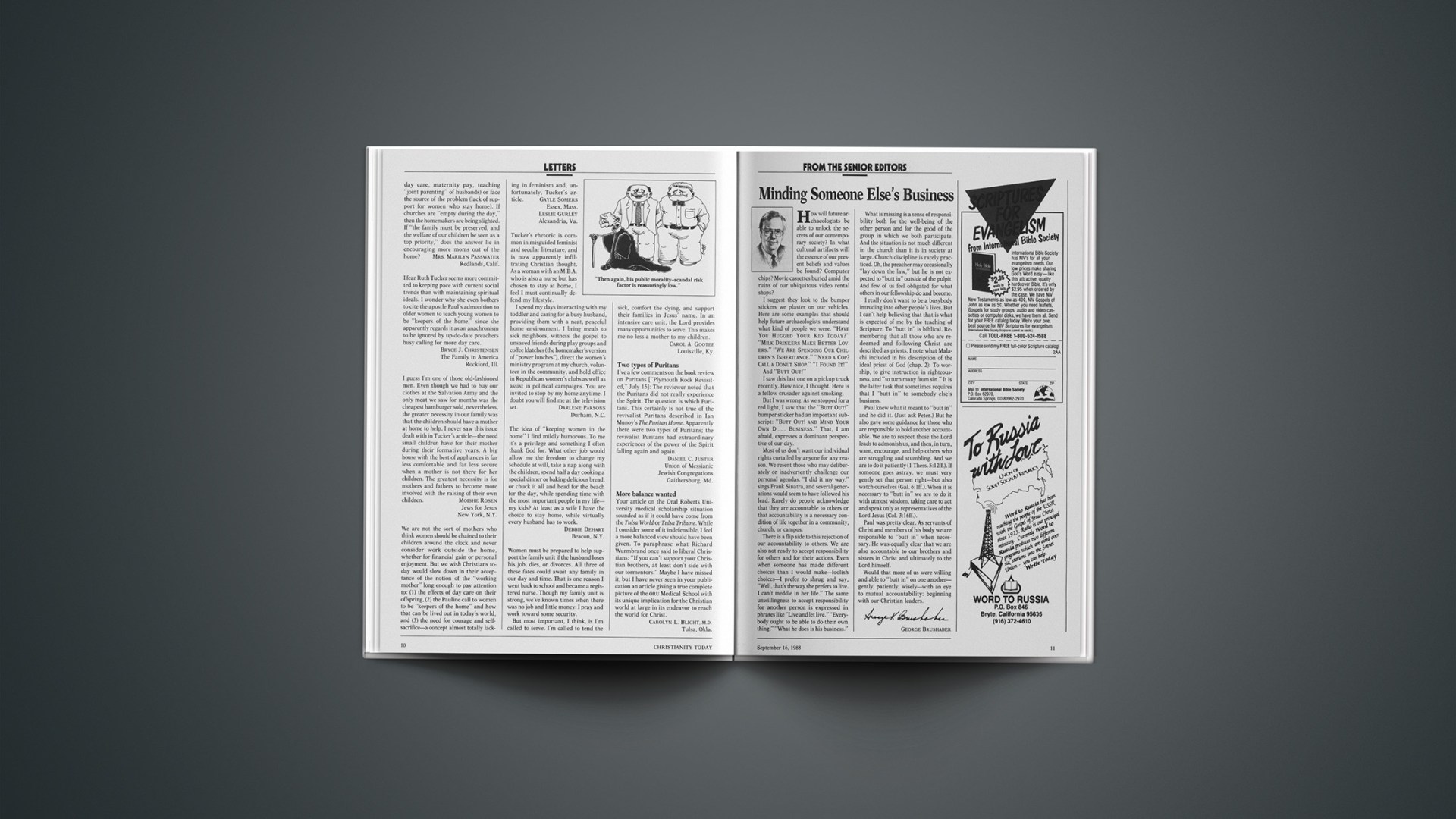How will future archaeologists be able to unlock the secrets of our contemporary society? In what cultural artifacts will the essence of our present beliefs and values be found? Computer chips? Movie cassettes buried amid the ruins of our ubiquitous video rental shops?
I suggest they look to the bumper stickers we plaster on our vehicles. Here are some examples that should help future archaeologists understand what kind of people we were. “HAVE YOU HUGGED YOUR KID TODAY?” “MILK DRINKERS MAKE BETTER LOVERS.” “WE ARE SPENDING OUR CHILDREN’S INHERITANCE.” “NEED A COP? CALL A DONUT SHOP.” “I FOUND IT!” And “BUTT OUT!”
I saw this last one on a pickup truck recently. How nice, I thought. Here is a fellow crusader against smoking.
But I was wrong. As we stopped for a red light, I saw that the “BUTT OUT!” bumper sticker had an important subscript: “BUTT OUT! AND MIND YOUR OWN D ___ BUSINESS.” That, I am afraid, expresses a dominant perspective of our day.
Most of us don’t want our individual rights curtailed by anyone for any reason. We resent those who may deliberately or inadvertently challenge our personal agendas. “I did it my way,” sings Frank Sinatra, and several generations would seem to have followed his lead. Rarely do people acknowledge that they are accountable to others or that accountability is a necessary condition of life together in a community, church, or campus.
There is a flip side to this rejection of our accountability to others. We are also not ready to accept responsibility for others and for their actions. Even when someone has made different choices than I would make—foolish choices—I prefer to shrug and say, “Well, that’s the way she prefers to live. I can’t meddle in her life.” The same unwillingness to accept responsibility for another person is expressed in phrases like “Live and let live.” “Everybody ought to be able to do their own thing.” “What he does is his business.”
What is missing is a sense of responsibility both for the well-being of the other person and for the good of the group in which we both participate. And the situation is not much different in the church than it is in society at large. Church discipline is rarely practiced. Oh, the preacher may occasionally “lay down the law,” but he is not expected to “butt in” outside of the pulpit. And few of us feel obligated for what others in our fellowship do and become.
I really don’t want to be a busybody intruding into other people’s lives. But I can’t help believing that that is what is expected of me by the teaching of Scripture. To “butt in” is biblical. Remembering that all those who are redeemed and following Christ are described as priests, I note what Malachi included in his description of the ideal priest of God (chap. 2): To worship, to give instruction in righteousness, and “to turn many from sin.” It is the latter task that sometimes requires that I “butt in” to somebody else’s business.
Paul knew what it meant to “butt in” and he did it. (Just ask Peter.) But he also gave some guidance for those who are responsible to hold another accountable. We are to respect those the Lord leads to admonish us, and then, in turn, warn, encourage, and help others who are struggling and stumbling. And we are to do it patiently (1 Thess. 5:12ff.). If someone goes astray, we must very gently set that person right—but also watch ourselves (Gal. 6:1ff.). When it is necessary to “butt in” we are to do it with utmost wisdom, taking care to act and speak only as representatives of the Lord Jesus (Col. 3:16ff.).
Paul was pretty clear. As servants of Christ and members of his body we are responsible to “butt in” when necessary. He was equally clear that we are also accountable to our brothers and sisters in Christ and ultimately to the Lord himself.
Would that more of us were willing and able to “butt in” on one another—gently, patiently, wisely—with an eye to mutual accountability: beginning with our Christian leaders.
GEORGE BRUSHABER










